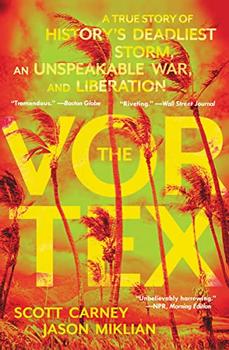Summary | Excerpt | Reviews | Beyond the Book | Readalikes | Genres & Themes | Author Bio

A True Story of History's Deadliest Storm, an Unspeakable War, and Liberation
by Scott Carney , Jason Miklian
"Why don't they cheer us, Hafiz?" one Punjabi striker whispered into Hafiz's ear while their coach gave his half-time pep talk.
That was the question. Hafiz could answer, but he didn't have a spare hour to do so. Instead, he looked around at the ratty wooden benches that he and his teammates sat on and thought of the gleaming locker rooms in the Islamabad stadium. East Pakistan couldn't even afford to give players their own lockers.
Hafiz wasn't about to launch into a generational history lesson about how West Pakistan had suppressed Bengalis at every possible turn. How could he capture all of the inequality, the violence, the injustice in a few whispered words? So he waved his teammate off. He preferred to let his feet do the talking.
Besides, why did they have to talk politics? Couldn't they just stick to football?
A sudden commotion outside the locker room interrupted the coach's flash strategy session. The players heard something crash and someone yell, "Stop!"
Hafiz jumped up and peeked around the corner, bumping headlong into a group of Bengali student activists who had just pushed past security. They demanded the coach show himself.
East Pakistan's biggest political party, the Awami League, liked to insert itself into just about every aspect of life in Hafiz's half of the country. Apparently they wanted to talk game strategy, too.
One student stepped forward, wearing a starched white embroidered kurta that appeared far too dignified for his irate manner. He presented the coach with their sole demand: The National Team must field only Bengali players in the second half. "If you don't, we'll riot."
It wasn't an idle threat. They'd employed similar tactics before.
The coach explained that acquiescing to their demand would mean that they'd have to leave their two best defenders on the bench. They had a chance at a major upset here. Couldn't the students just let the team do its best to win?
The student countered that if the coach refused and the stands turned bloody, the team would have to forfeit to the Soviets anyway.
The coach looked at the floor and shook his head.
Hafiz glanced across the locker room at two Punjabi defenders in their grass-stained jerseys. Despite their different home regions, the three were friends, and the team needed their talent badly. Fighting to a tie, this far, had been lucky. It would take all the team's best players on the field to stand a chance.
Hafiz didn't want to end his career like this. Maybe a little star power would sway the protesters to give up their demands, just this once.
He took a few steps toward the students, but just as he was about to open his mouth, his mind conjured an image of something even more powerful than his desire to win: his father's disapproving face. The corresponding jolt of shame stopped him in his tracks faster than even the most imposing Soviet defender.
Back on Hafiz's home island of Bhola—East Pakistan's biggest island, which hosted a million people in a space about the size of Rhode Island—his father, Dr. Azhar Uddin Ahmad, loomed large. Not only was he the island's most respected doctor but he was also their elected Awami League representative. As a member of Pakistan's parliament, he fought incessantly to reduce discrimination against Bengalis, insisting on equal treatment from the government. These students had the same mission at heart, even if they went about it in a way that was inconvenient to Hafiz. He could never disrespect his father by challenging them over a game, even one as important as this one. Hafiz slunk back to the bench without a word. The coach gave in.
In truth, Hafiz's father was the reason he was retiring from football. While the Bengalis loved Hafiz on the field, he knew he could never truly fill his father's shoes by staying on the pitch. He needed to leave the game behind and, as his father put it, "do something in service to the country." In fact, according to his father, he should have done this years ago.
Excerpted from The Vortex by Scott Carney and Jason Miklian. Copyright © 2022 by Scott Carney and Jason Miklian. Excerpted by permission of Ecco. All rights reserved. No part of this excerpt may be reproduced or reprinted without permission in writing from the publisher.
Every good journalist has a novel in him - which is an excellent place for it.
Click Here to find out who said this, as well as discovering other famous literary quotes!
Your guide toexceptional books
BookBrowse seeks out and recommends the best in contemporary fiction and nonfiction—books that not only engage and entertain but also deepen our understanding of ourselves and the world around us.